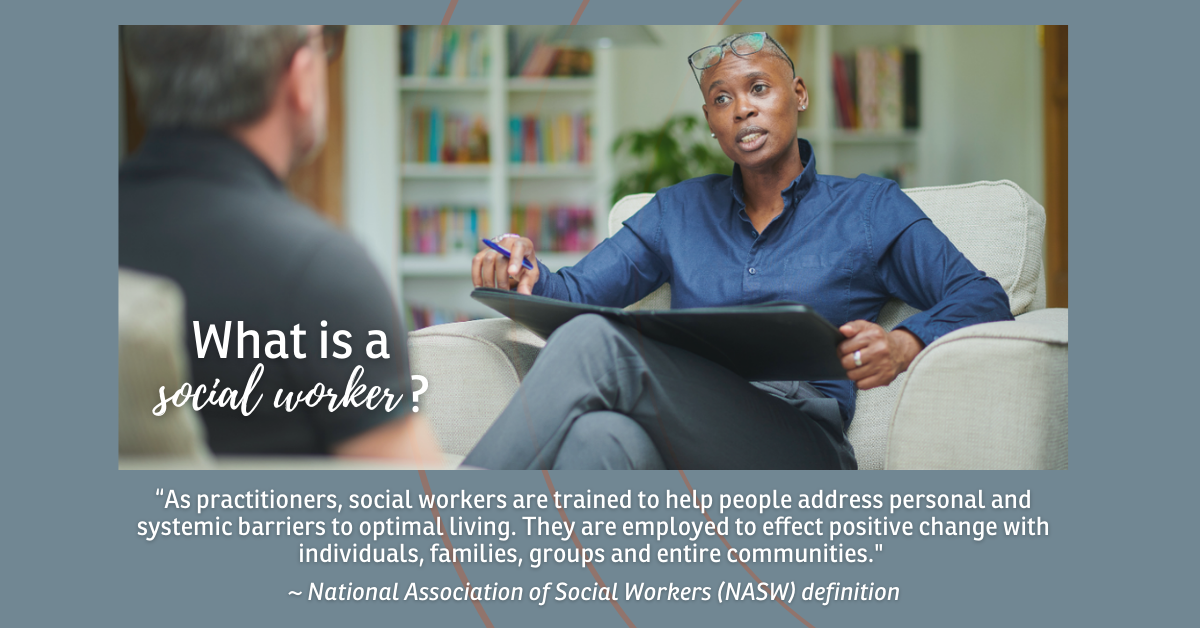Social Work Month in March Spotlights How Profession Promotes Healing
 Social workers have been described as problem solvers, critical thinkers, counselors, activists and researchers. The people that social workers assist often see them in simpler terms: a guiding light, a gentle hand to steer toward reaching goals or an empathetic directive to take the first steps toward a journey of healing.
Social workers have been described as problem solvers, critical thinkers, counselors, activists and researchers. The people that social workers assist often see them in simpler terms: a guiding light, a gentle hand to steer toward reaching goals or an empathetic directive to take the first steps toward a journey of healing.
Social work is one of the fastest growing professions in the United States, according to the Bureau of Labor Statistics (BLS). There are currently about 700,000 professional social workers in the U.S., but BLS estimates that number is expected to rise to more than 800,000 by 2029.
Senior Vice president of Operations – Outpatient Behavioral Health Lyndril Leonard, also a therapist who has worked with children, adolescents and adults, says that the impact social workers have on the lives of the people we support is invaluable. Their compassionate guidance is visible in their work helping people overcome a mental illness, heal from a trauma or recover from a substance use disorder.
“Most people think of social workers when they think of poverty alleviation and child welfare. Many social workers do that kind of work and much more,” Leonard remarked. “Our licensed clinical social worker offers counseling services to those individuals in need. They also act as advocates for disadvantaged individuals and connect them to resources and services. Our licensed clinical social workers counsel and provide crisis intervention for people we support, including assessment and treatment of emotional and behavioral problems.”
Here is what a few of our Monarch social workers think about their role and what it means to them.
Corrine Shuster, LCSW, Behavioral Health Therapist V, Navaho Road Behavioral Health Outpatient, Wake County
 Shuster recently transferred from providing outpatient therapy to a remote position completing assessments for Monarch’s Virtual Open Access and is grateful for the opportunity to “help people work to become the best version of themselves.”
Shuster recently transferred from providing outpatient therapy to a remote position completing assessments for Monarch’s Virtual Open Access and is grateful for the opportunity to “help people work to become the best version of themselves.”
“I love my job as a therapist . . . I am inherently a deep thinker and love exploring people’s thoughts and feelings. I love seeing people discover new things about themselves to help them take the next step in their journey,” she shared.
Shuster explained how she feels fortunate to have a front-row seat to help people that Monarch supports find a healing path in life, transforming into a healthier version of themselves. She describes the journey of one person supported who had not been employed in quite some time.
“This person not only started working again but also believing in themself and seeing the worth and value he has as a human being,” Shuster explained. “I have seen clients who thought they were lazy or liars learn a new narrative about themselves. I have seen people step into my office in their first weeks of sobriety and sustain it for three-plus years.”
A therapist is often described as someone who helps others find courage and strength to confront difficult emotions and experiences and Shuster agrees with that: “I am honored that I get to witness people’s raw form and that they trust in me to hold the space for their deepest thoughts and feelings.”
Latoya James, MBA, MSW, LCSW, Senior Therapist, Mecklenburg Behavioral Health Outpatient, Mecklenburg County
 James has been with Monarch for two years and uses a generalist approach to providing therapy. She would like to become certified in Eye Movement Desensitization and Reprocessing (EMDR) to treat adults who have experienced trauma and pursue learning about alternative medicine such as energy healing.
James has been with Monarch for two years and uses a generalist approach to providing therapy. She would like to become certified in Eye Movement Desensitization and Reprocessing (EMDR) to treat adults who have experienced trauma and pursue learning about alternative medicine such as energy healing.
James said she has always liked helping people. “I like being able to offer people alternative ways of looking at their situations while validating how they are feeling and meeting them where they are,” she shared.
James described that one of the most rewarding aspects of being a therapist is watching the proverbial “light bulb” go off during a session as well as seeing a person’s demeanor improve as treatment progresses. “It is rewarding for me to see how relaxed clients become when I let them know that I am human first, no matter my title, degree or status . . . I am human first and I may share a similar story. I can relate to clients in some way and build a rapport quickly.”
James shared that it is heartwarming to see the excitement of people she supports as they arrive for therapy: “Seeing how some clients cannot wait to talk to me so that they can receive a jewel or two to take with them until we meet again is one aspect about my role that I enjoy.”
Matthew Drew, MSW, LCSW, Behavioral Health Therapist V, Greensboro Behavioral Health Outpatient, Guilford County
 Drew, who specializes in the areas of mental health trauma, has been with Monarch since 2017 and currently works as a therapist in Virtual Open Access He assesses new individuals seeking mental health services as well as returning persons supported. Following an assessment, he assists with connecting the person supported to appropriate Monarch services or outside agency services. “I have honed my diagnostic skills and have excelled at helping triage people we support,” Drew explained, adding that while completing assessments he provides education on their mental health diagnosis.
Drew, who specializes in the areas of mental health trauma, has been with Monarch since 2017 and currently works as a therapist in Virtual Open Access He assesses new individuals seeking mental health services as well as returning persons supported. Following an assessment, he assists with connecting the person supported to appropriate Monarch services or outside agency services. “I have honed my diagnostic skills and have excelled at helping triage people we support,” Drew explained, adding that while completing assessments he provides education on their mental health diagnosis.
Drew noted that he likes offering people supported clarity and often advises how shame or guilt don’t help but hurt the healing process. “It is rewarding to help people understand that mental illness is caused by genetics and their environment growing up and that they are not at fault for their own problems and find a way to take back control of their life,” he noted.
Drew observed that he learns valuable lessons from everyone that crosses his path: “I get to meet new people every day and through knowing more people I can learn more about how alike we all really are no matter how different our circumstances may be.”
Sirrell Butler, MSW, LCSW, Behavioral Therapist V, Greensboro Behavioral Health Outpatient, Guilford County
 Butler, who has been with Monarch for eight months and has experience working with at-risk youth and teenagers, completes comprehensive clinical assessments through interviews with individuals and families to determine a diagnosis. She also sees people supported in individual therapy.
Butler, who has been with Monarch for eight months and has experience working with at-risk youth and teenagers, completes comprehensive clinical assessments through interviews with individuals and families to determine a diagnosis. She also sees people supported in individual therapy.
The appeal of social work for Butler was the opportunity to have a direct impact on others. “I truly enjoy engaging in therapy. This is where I get to connect with people from all different walks of life, provide a safe place for them to be themselves, allow them to share their struggles, all while helping them stay on track with their goals,” she stated.
Butler gave an example of a person supported who has shown great progress in a short amount of time. He is approaching his fiftieth birthday and felt stressed, defeated, angry and was searching for direction in healing from a mental health diagnosis.
Butler focused on educating him through Cognitive Behavioral Therapy (CBT) and restructuring his negative mindset. Therapy has proven to assist him in taking steps toward starting his own business, maintaining his medication regimen, exercising and eating healthy. “I am very proud of this gentleman and the progress that he has made for himself and with his family in such a short amount of time,” she observed.

Posted on: Thursday February 25, 2021
